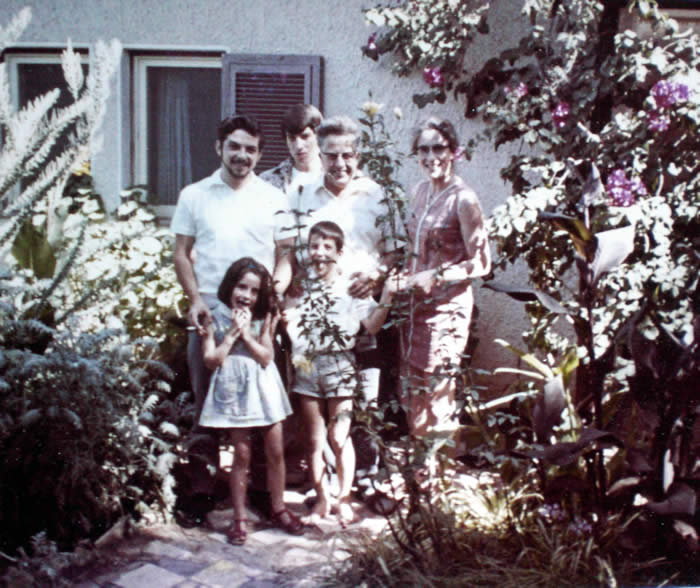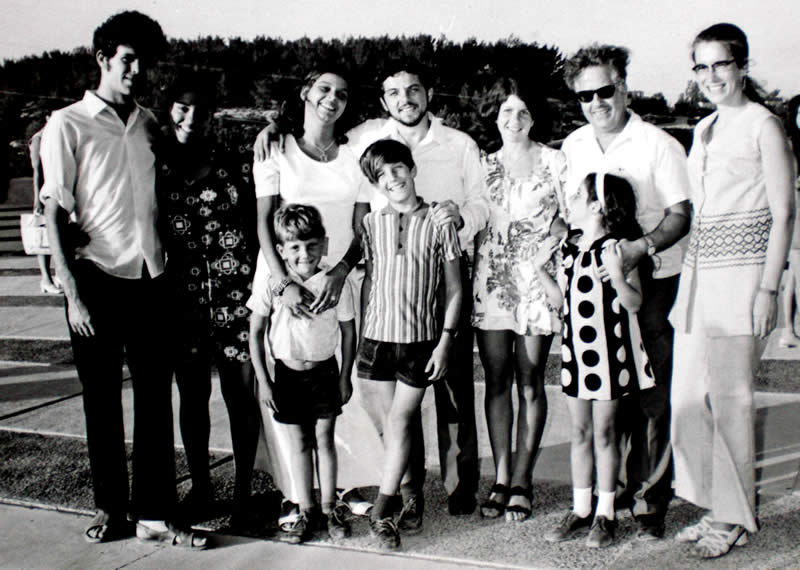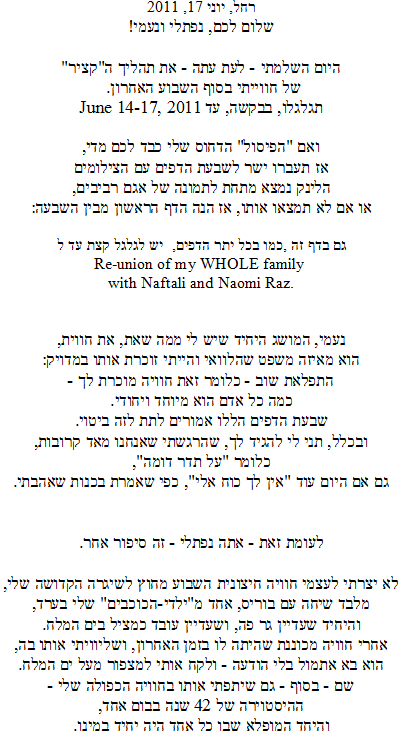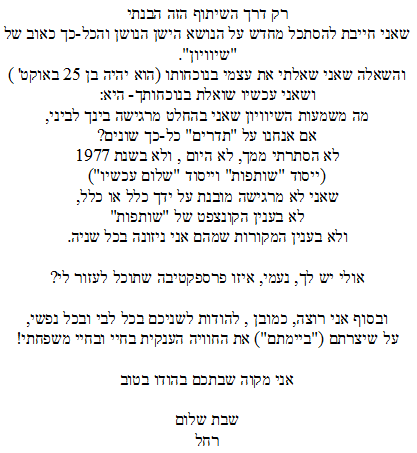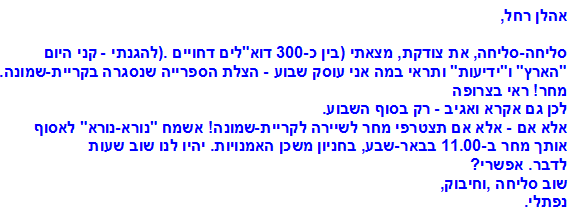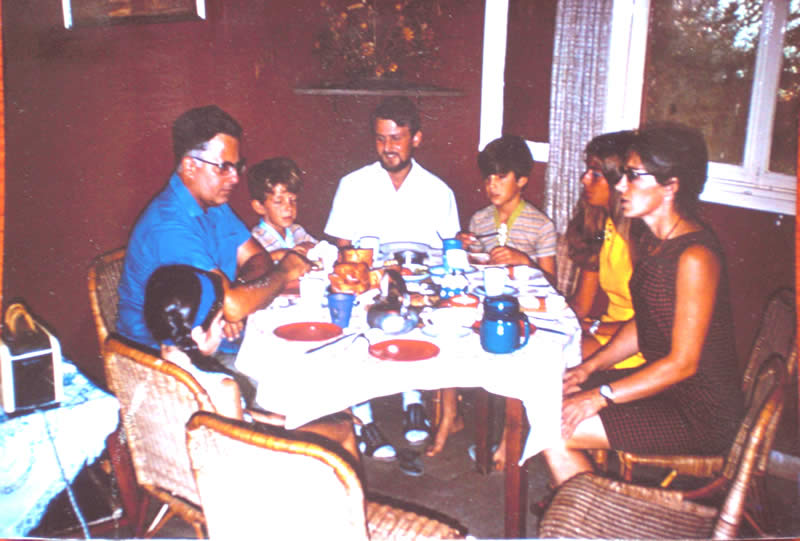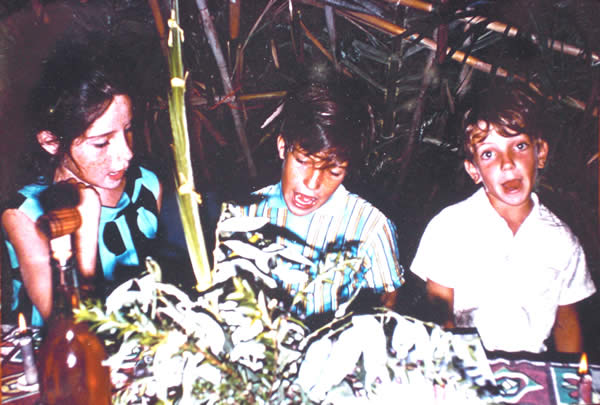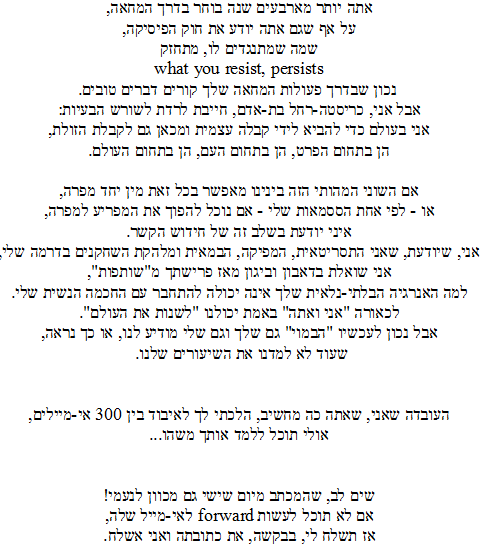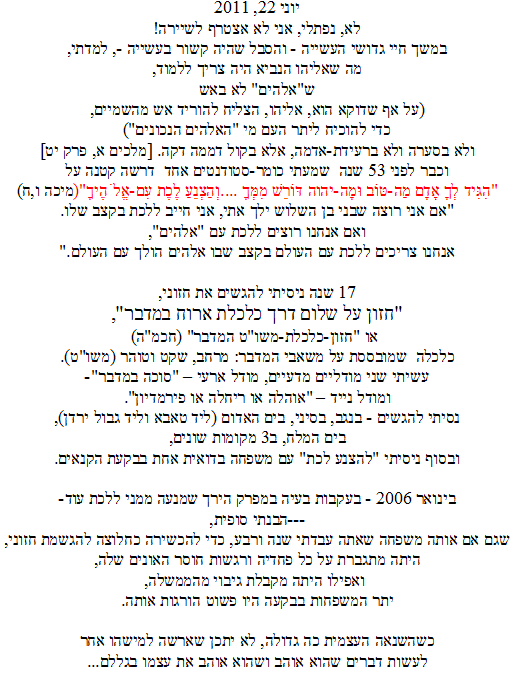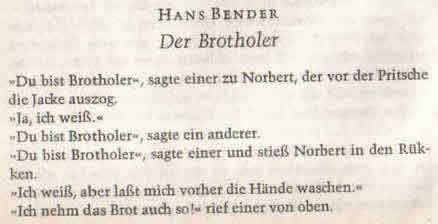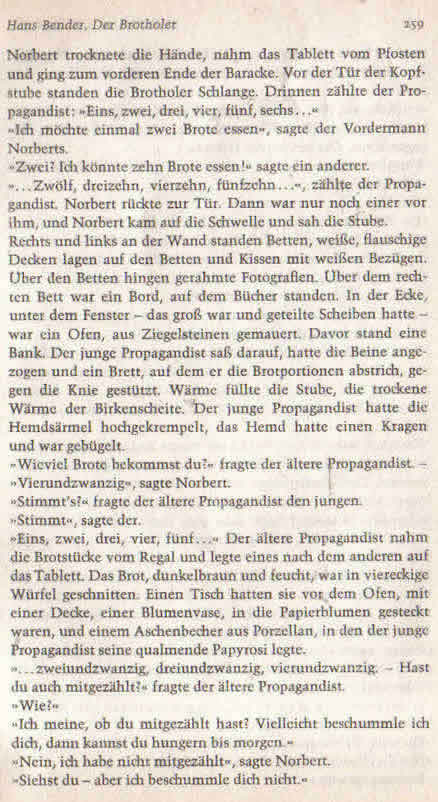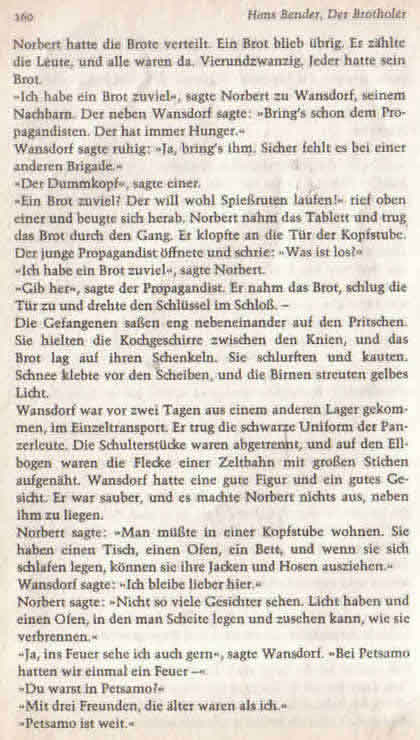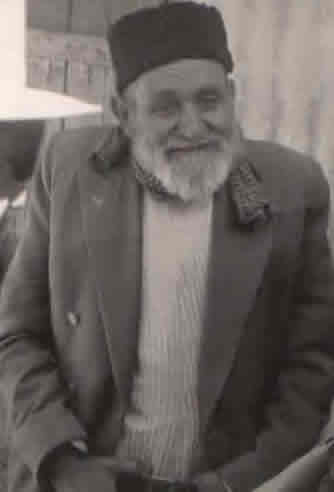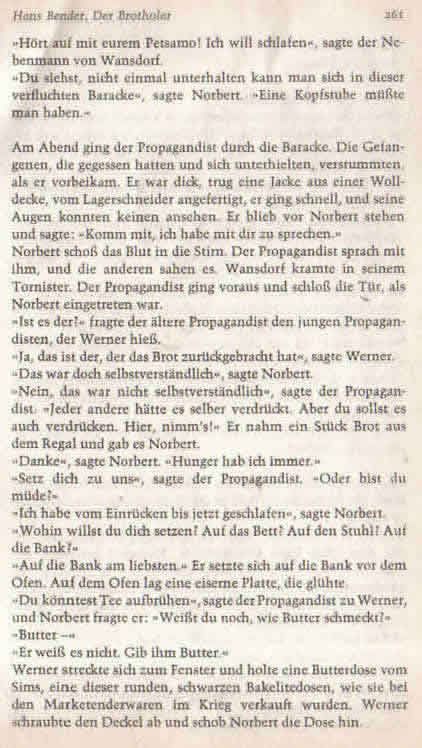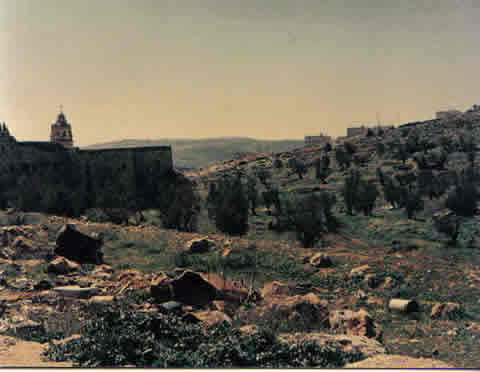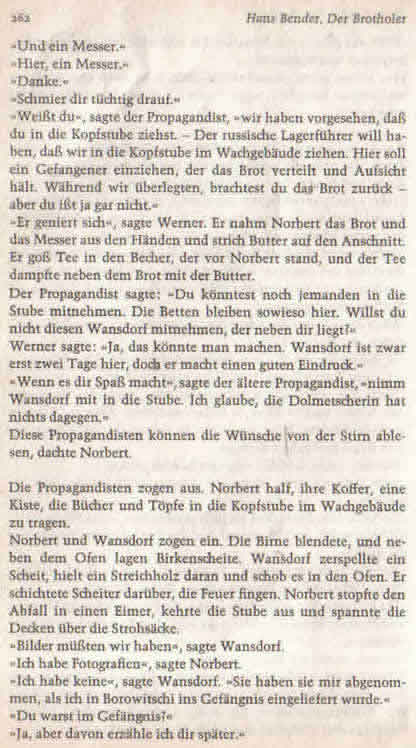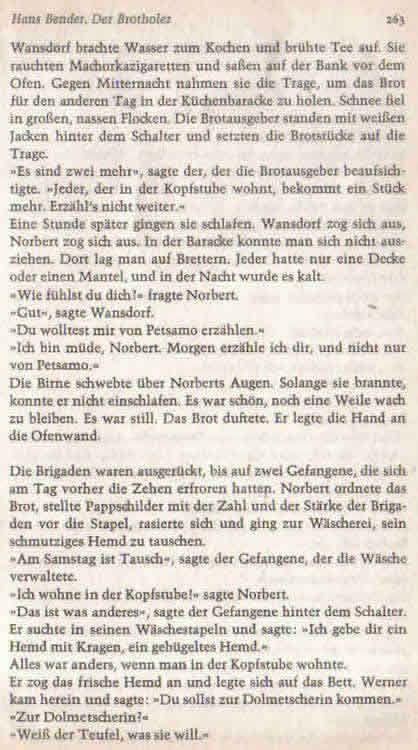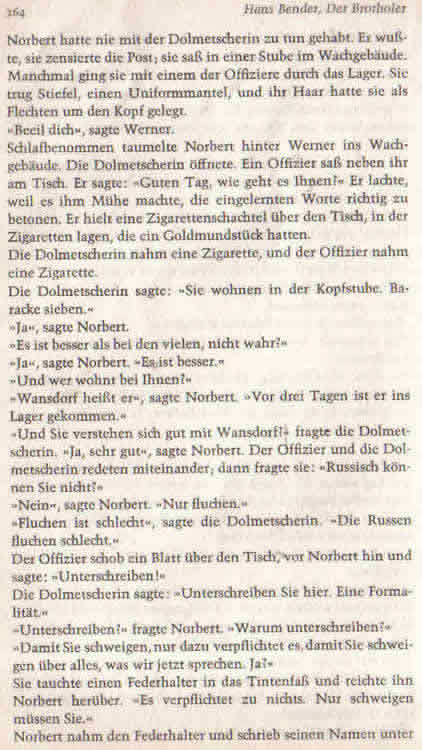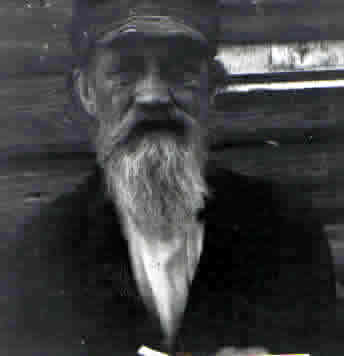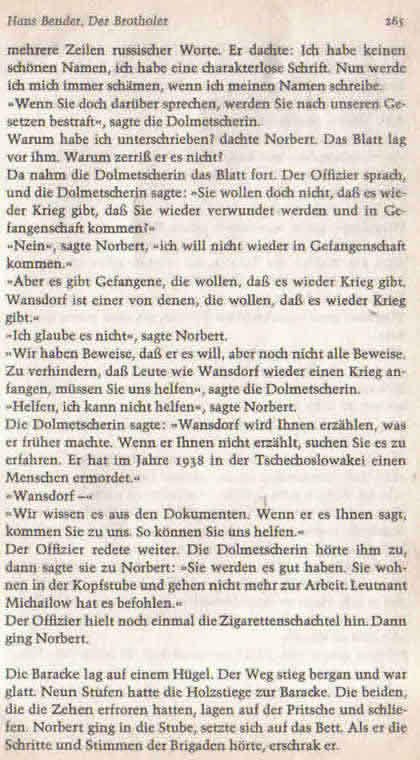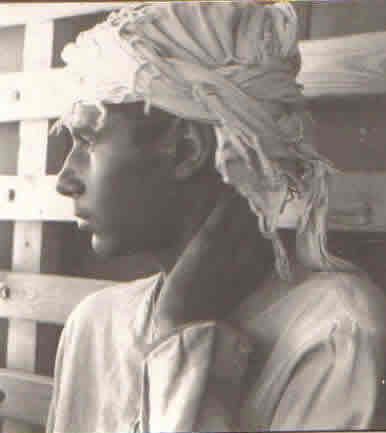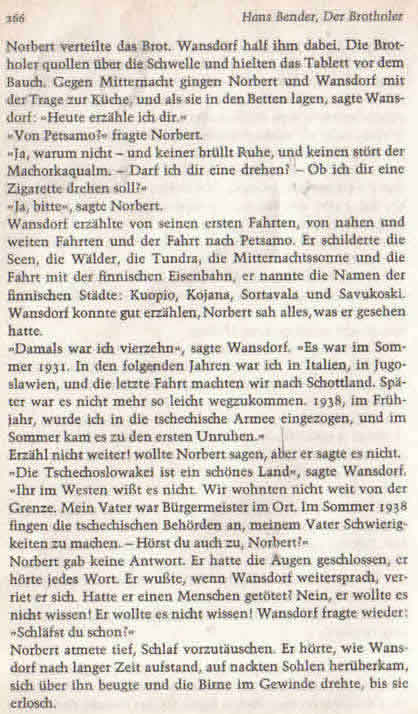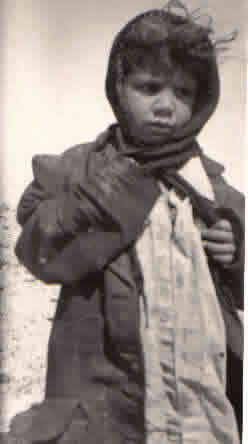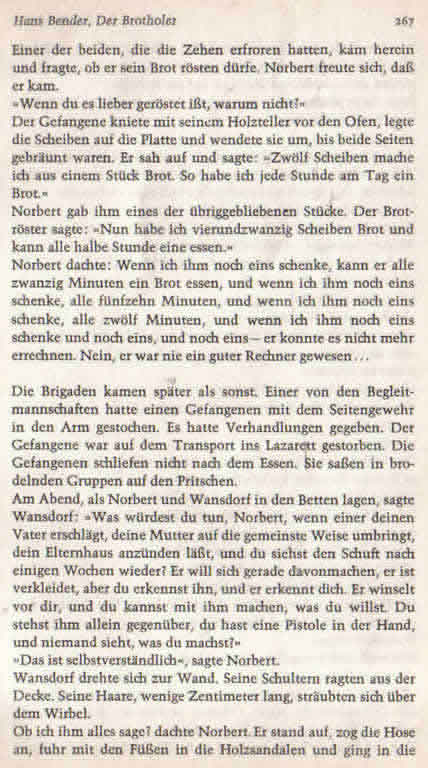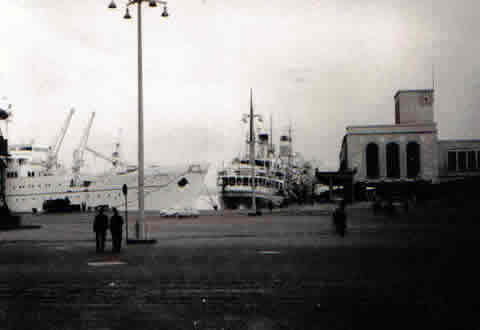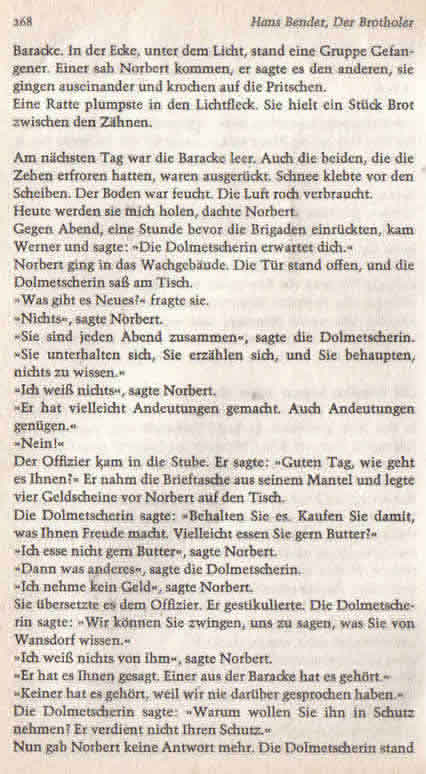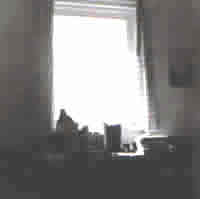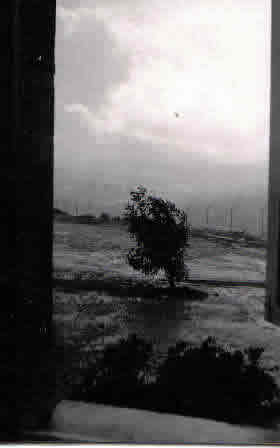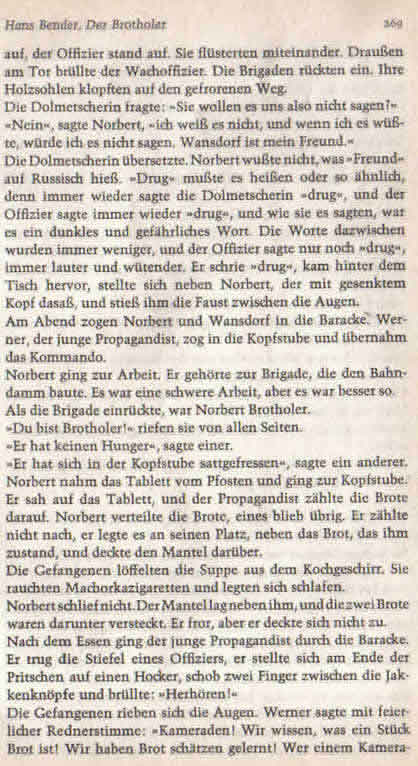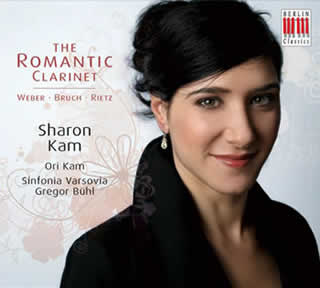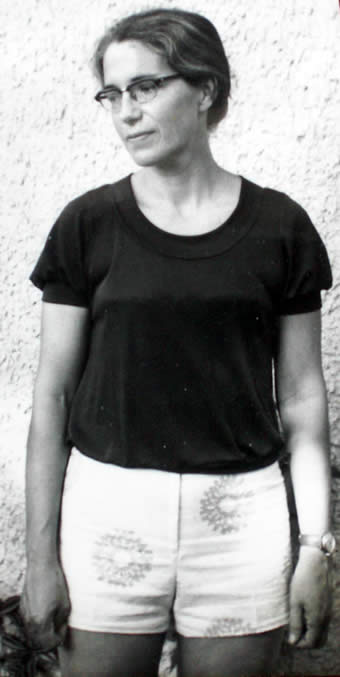Yesterday evening~~~ a few hours~~~ and
a flood of memories,
which comprise 60 years and four countries.
I
am at Shoham,
it's almost a year now, that I commute between Arad in the desert
and Shoham near the airport in the center of Israel.
I am working on my computer,
little Mika - almost two years now - sleeps like an angel,
Immanuel
is in New-York between his pilot-flights to and fro,
Efrat
went back to work
- the final stress before the new monthly edition of the Shoham newspaper,
which she produces.
I notice, that at 21:40 there will be something worthwhile on TV.
A documentary about "Operation
Morale" in 1961,
the illegal, immensely dangerous emigration
of 530 children,
from Morocco via Switzerland to Israel.
I call Efrat
"Your parents in Acco might be interested!"
They immigrated from Morocco sometime after
1961,
when Israel had reached a secret deal with the Moroccan king,
and 100000 Jews left Morocco.
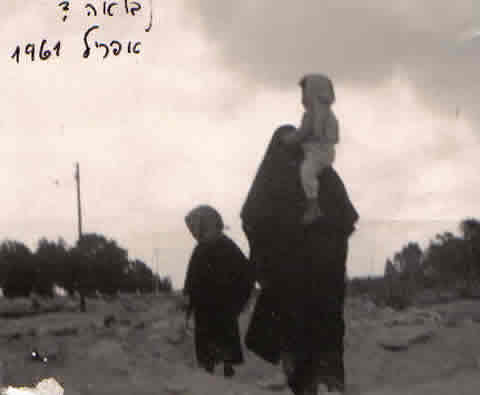
A Bedouin mother with two children,
my photo in 1961
The Israeli Mossad feared that the Jews,
who had not taken advantage of free emigration from Morocco
until the end of the French occupation in 1956,
were in danger of life,
and so, after some 44 parents and children drowned in January 1961,
when trying to escape on a boat,
the Israelis succeeded within 3 months to "rescue" 530 children.
The doc. was interspersed with pieces of interviews with some of them.
One such child was seven year old,
when they ripped him off his family.
Now he appeared in army uniform,
and shared his perspective - a deeply painful one:
"My mother had 9 children.
She chose three of us for the "operation".
But what made her choose me?
I was seven, I wanted to stay with my mother,
why did she send me away,
was I no good?"
And after so many years~~~
he put his hands over his eyes,
not to show his tears.
There were pieces of another interview interspersed in the doc.
The old man, who appeared time and again, was known to me.
Shmuel Toledano!
He was the leader of the operation in Israel.
I remember him! Grate-fully!
31 years ago he was the one responsible for "minorities"
in the Israeli government.
He tried to help me, as much as he could,
with
my Bir'am project.
But then he had an assignment for a month in the US,
and I had to "work" with the man who replaced him.
The main issue in those 4 weeks was the summer-camp,
which we had prepared with and for the young people
of Bir'am on the one hand,
and the three Jewish villages,
Kibbutz Bar'am, Kibbutz Sasa, Moshav Dovev,
which thrived on former Bir'am lands.
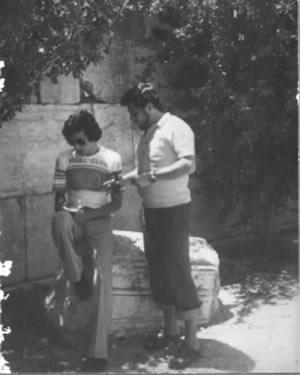
Sitting on ancient Jewish
Bir'am ruins - they plan the camp:
Gasan Mtanes, the representative of the Bir'am youth,
and Naftali Raz, a parachuter, scout-leader and peace-fighter till
now,
was - on and off - my main Jewish partner in "Partnership"
That man, who was supposed to replace Toledano,
told me,
that I had to ask permission from these and these and these authorities.
One of them was~~~~~
the Army Commander of the Northern District,
Rafooul (Rafael Eitan).
So I knocked at the door of the Northern District in Nazareth.
I was used to being received.
Accept for Golda Meir nobody had refused to see me so far.
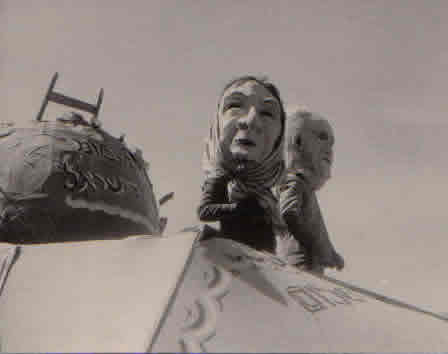
Purim 1961, Ben-Gurion and
Golda Meir,
But I was not let in.
"The commander will not see you."
A few days later Toledano returned
and I found myself again with him in Jerusalem.
But when he heard the story,
his face fell
and he said in a tone, which I'll never forget:
"O Rachel, you shouldn't have done that!
You should have circumvented Rafoul!
Now I fear, everything is lost."
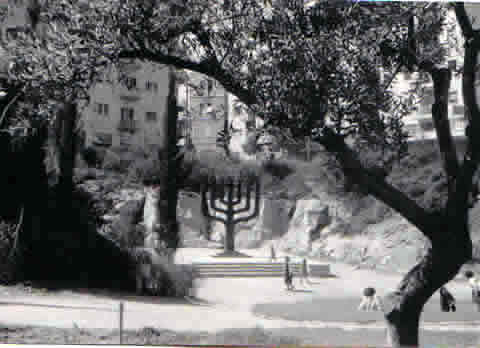
In the sixties: The Menorah next to
the first Knesset building,
And indeed, everything, simply everything
was lost.
Rafoul reported to the government,
Yitzchak Rabin announced, that the summercamp would not be allowed.
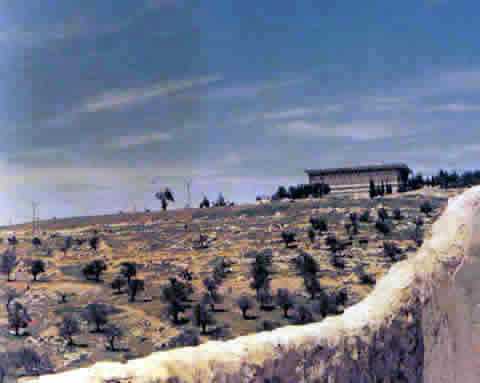
The Knesset, photographed in color
by my mother in 1966
A "she'ilta", an interpellation
was raised in the Knesset,
Rabin answered, but did not go back on himself.
No summercamp!
This meant, that I had lost the trust of the Bir'am people,
the trust for which I had worked so hard for so many months
against so many odds!
Of course, on a metaphysical level I know,
why I had to fail.
While every single action, project, vision in my life had to fail,
except for my
mobile home and "Succah
in the Desert".
Still, when Toledano's head appeared again and again in that doc.
31 years after I saw him for the last time,
all those memories re-emerged...
[on July 7, 2011, I read an
article about him, born in 1921, and still alive!]
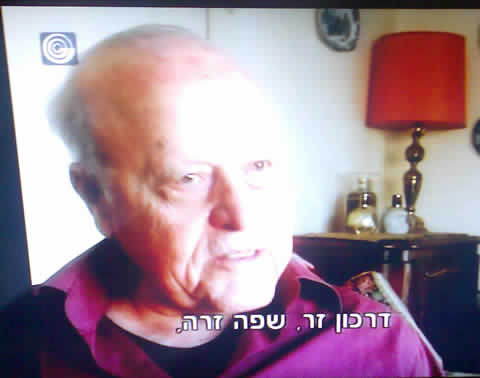
"A foreign passport, a foreign language"
was - by chance - the subtitle,
when I hurried to take a photo of the TV screen.

But the Bir'am-Toledano time was not the only memory,
stirred up by the documentary and the discussion which followed it.
Those children! ripped away from there parents!
Two people appeared on my inner screen,
of whom I hadn't thought for a long time.
Now they looked at me, as if we had just met.
It was during my scholarship year in Jerusalem, 1960-1961.
Yes, - as I realize only after the completion of this sculpture -
it was the same year, in which the "Operation Morale" was
organized.
1961
There was Shimon Sachs,
headmaster of a school of children of Sephardic immigrants,
at Nehora,
5 km west of Kiryat Gat,
He and his wife Shoshana had survived the holocaust,
while both their entire families were wiped out.
Shortly before the war in 1939
they had been brought from Berlin to England
by the Zionist Youth Immigration Organization.
"I was thirteen",
told Shoshana.
I don't remember details of their story,
but the scene of parting from her parents at the train-station
is imprinted in my memory,
and among the few notes I found about Shimon Sachs,
- only
on the German Internet -
was this sentence:
"Erich
Dauzenroth sieht
im Gesicht des Kibbuz-Pädagogen Shimon Sachs
auch den deutsch-jüdischen Jungen,
der sich 1938 auf dem Berliner Anhalter Bahnhof
für immer von seiner Familie verabschiedet.
Die gesamte Familie wird durch die Nazis ermordet." |
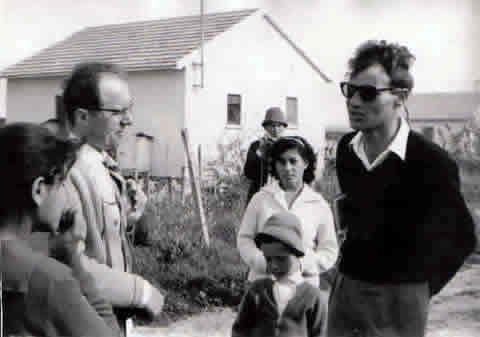
Shimon Sachs with my teacher Reinhold Mayer
in Nehora
on Mayer's study travel with a group of German students,
one of the very first that were allowed into Israel, in 1961.
Though studying in Jerusalem I took part in this journey.
I had a terrible experience with the traumatized
family,
Shimon, Shoshana and their two children.
In summer 1961, they invited me to stay in their house for some days,
before I would return to Germany from my scholarship year .
It was not the first time, that I came to Nehora.
But this time they were receiving me all packed and ready to leave:
"We have to go there and there,
but you may stay here,
there is food in the fridge,
here is the key", etc.
I stood there,
mouth open,
knowing, that they simply couldn't bear the presence of German girl.
It was the time of the Eichmann process
which opened all the wounds again…
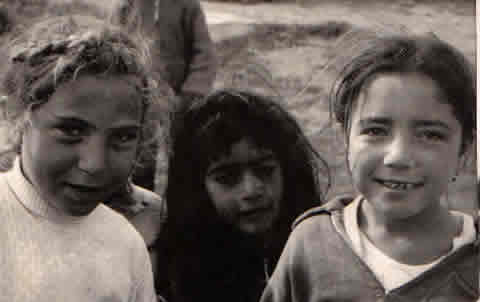
I left the forsaken house in Nehora
and hitchhiked I don't know where.
While waiting on the road-side,
these little girls approached me,
asking me about the Nazis and the Eichmann trial~~~~
I found comfort in their very existence.

Back in Shoham, late at night, on December
16, 2007,
I search for Shimon and Shoshana Sachs on the Internet.
In the Hebrew Internet I didn't find anything,
but in the German one I did.
Which in itself is a symbol of Shimon's tragedy.
He never could let go of his German heritage.
Once, in the winter 1963-64, it so happened,
that he had to give a lecture in Boeblingen,
the town west of Stuttgart,
where I lived with my mother and with Immanuel,
my
"illegitimate" child,
conceived of a Jewish, Israeli, married father,
whose name, the son of Franz
Rosenzweig, was well known to Shimon.
It was during the week I lived in Tuebingen,
trying to be accepted to the final examinations in Protestant Theology....
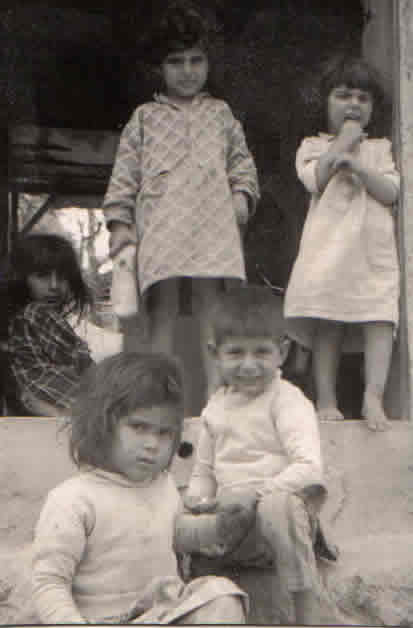
Children of new immigrants
in Beit-Shean, my photo in 1961
But to meet Shimon Sachs, I traveled to
Boeblingen.
I went to the lecture and invited him home and said:
"I want to show you something!"
I opened the door to my little room,
and there – a child,
which in my eyes was a Jewish child,
almost a year old,
sleeping safely in his bed.
Shimon was shocked.
More I don't remember.
I never met him or his family again,
when I immigrated to Israel half a year later.
Shimon was born in 1922 just like my husband,
but he died already in 1985.
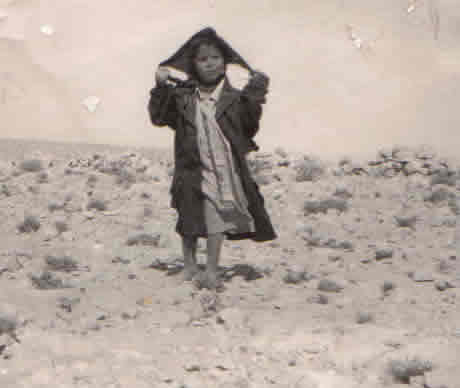
A Bedouin child, my photo in
1961
I couldn't find out anything about Shoshana,
nor about his son Hagai, then 6 years old,
whose name I remember because of a photo
I had inserted in a little hand-written book about children in Israel
in 1961.
The girl, some 6 years older, never showed her face, when I was around…
Shimon Sachs 1922-1989
His
books:
"Aus Nomadenkindern werden Schueler".
Ha-chalom ha-yaroq [The green dream].
Tel-Aviv, Mifaley Tarbut ve-Chinuch, 1964. 146 S. -
Schicksale u. Lebenswege junger Juden in Israel. -
1980 Prof. Dr. Shimon Sachs, Tel-Aviv
was the third person to receive the Janusz
Korczak price
Korczak-Preis der Deutschen Korczak-Gesellschaft e.V.
„Auszeichnung herausragender Leistungen auf den Gebieten
der Pädiatrie
oder Kinderliteratur oder der praktischen Erziehungsarbeit…“
|
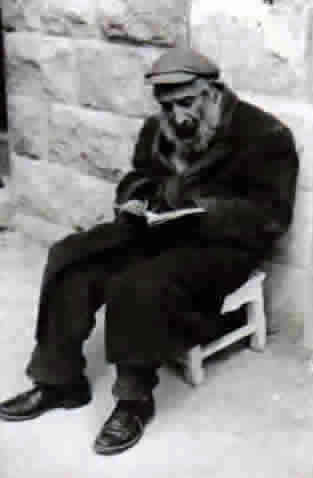
1961-A man praying in the streets
of Jerusalem.
Jerusalem then was still a divided city.
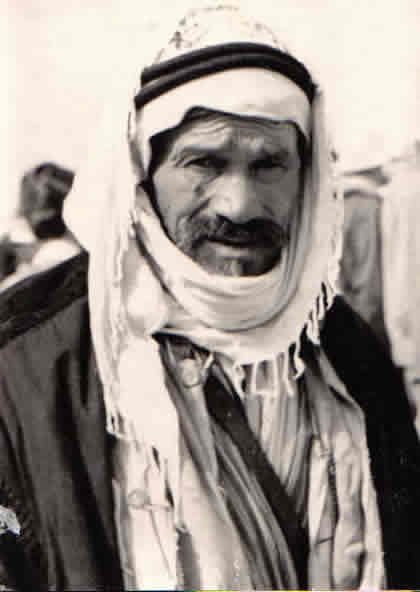
1961- a Bedouin man on the
market of Beersheva

How could I fall asleep after all this?
It was after midnight, and in order to tire myself,
I took the book on my side,
a volume of German short stories, written after World War II.
The only time I'm reading a paper-book, is before falling asleep,
and German literature published after I immigrated to Israel in 1964
rarely comes my way.
But when - during the
funeral of my sister Ursel in Nov. 2004 -
I slept for one night in what was once the room of my
niece Regina,
I discovered this book and decided,
that after all these years Regina would no longer "need"
it and took it.
At this time I'm reading it a second time.
And that's how Hans Bender's story weaved itself into my excitement
about the "Operation Morale", about Morocco and Israel.
Sure enough, it did not help me to fall asleep,
on the contrary,
entangled in these many threads
of general history and personal memories
I lay awake for hours.
Hans
Bender: The Bread-Fetscher, 1957
July 7, 2011: The photo and
info, which I had inserted here in 2007,
seems to belong to another Hans Bender , a parapsychologist,
who according to Wikipedia, entered the Nazi service in 1940,
and was in British detention from 1945-1947.
I could not find any biographical info about the author Hans Bender,
except the fact, that he was a prisoner-of-war in Russia.
I definitely don't want to mix him up with that parapsychologist...
This short story about German war-prisoners
in Russia
moved me deeply:
not so much because of what "happened" to these prisoners,
how they were suffering hunger, cold, crowdedness and hard work,
and how they were lured into spying on each other
and betray their greatest values.
What was moving was the intricate fabric
of good and evil, of naivite and slyness,
of collective cruelty and personal friendship,
of playing victims and mastering destiny.
In short: a story about life itself.
It also brought up
what seemed to be an unimportant memory from childhood:
In March 1944 our fatherless family was evacuated
from bombarded Stuttgart to a tiny village "Wolfartsweiler".
After May 1945 Stuttgart belonged to the American Occupation Zone,
while Wolfartsweiler belonged to the French Occupation Zone.
In December 1946 the French evicted us back to American Stuttgart.
Since in Stuttgart many houses were destroyed by the bombardments,
people who still had their flats were forced
to take in people without flats.
Thus we ended up in a flat with three rooms, a bathroom and a kitchen.
Our family, widow + three children age 4 to 8,
where assigned two rooms,
while the childless Frau Wenagel, the owner, had to live in one room.
We were told, that her husband was a prisoner of war in Russia.
Though I was and am "over-compassionate" by nature,
I now realize, that at that time I never gave it any thought,
what Herr Wenagel went through in faraway Russia or Siberia,
or - for that matter - what his wife went through;
no husband, no children, no work, no privacy,
with a mother who was a nervous wreck and 3 little kids on top of
her.
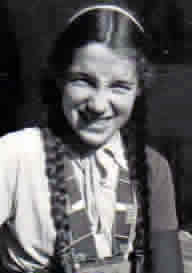
About 1950, one of the few
photos in all those years,
since our camera had been confiscated
by the French Occupation Authorities
in the little village to which we were evacuated
All this lack of identification on my part
came up this night
and I wondered about myself…
In 1951 or so Herr Wennagel came back
and our situation became even worse,
but that is another chapter.
I never heard a single word about his time in Russia...

![]()
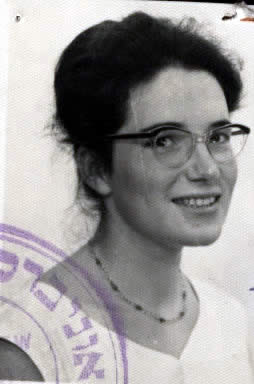
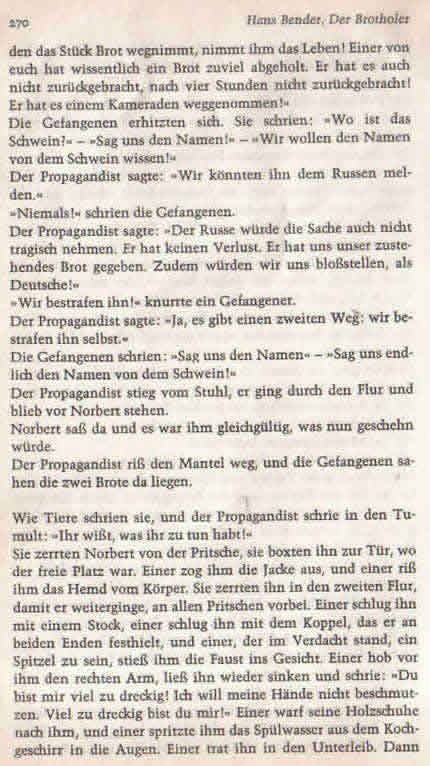
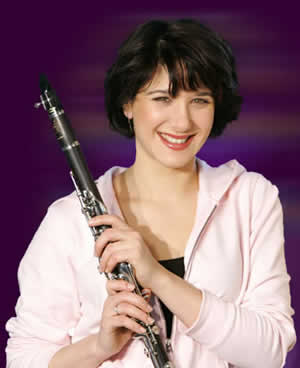
 no more
specific pages of "closeup of my Past"
no more
specific pages of "closeup of my Past"